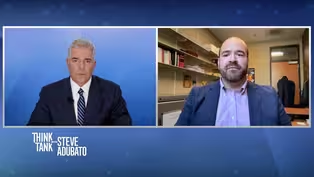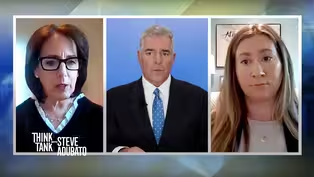
Investing Federal Funds In Opioid Prevention And Recovery
Clip: 6/1/2024 | 9m 12sVideo has Closed Captions
Investing Federal Funds In Opioid Prevention And Recovery
Sarah Adelman, Commissioner of the New Jersey Department of Human Services, sits down with Steve Adubato for a compelling conversation about the opioid epidemic and how national funds are being allocated to support prevention and recovery.
Problems playing video? | Closed Captioning Feedback
Problems playing video? | Closed Captioning Feedback
Think Tank with Steve Adubato is a local public television program presented by NJ PBS

Investing Federal Funds In Opioid Prevention And Recovery
Clip: 6/1/2024 | 9m 12sVideo has Closed Captions
Sarah Adelman, Commissioner of the New Jersey Department of Human Services, sits down with Steve Adubato for a compelling conversation about the opioid epidemic and how national funds are being allocated to support prevention and recovery.
Problems playing video? | Closed Captioning Feedback
How to Watch Think Tank with Steve Adubato
Think Tank with Steve Adubato is available to stream on pbs.org and the free PBS App, available on iPhone, Apple TV, Android TV, Android smartphones, Amazon Fire TV, Amazon Fire Tablet, Roku, Samsung Smart TV, and Vizio.
Providing Support for PBS.org
Learn Moreabout PBS online sponsorship- We're now joined by the commissioner of the New Jersey Department of Human Services, Sarah Adelman.
Commissioner, thank you for joining us.
- Good to be with you.
- Sarah, put this in context.
We're gonna be talking about the opioid crisis in the state, but more specifically, a few months back, Governor Murphy announced the allocation of over $95 million from New Jersey's Opioid Recovery and Remediation Fund to support critical programs dealing directly with the opioid crisis.
First, make it clear where that money comes from, who that money comes from, and what exactly it's for, please, Commissioner.
- Yes, so over the next essentially two decades, New Jersey will be receiving about a billion dollars as part of national litigation with the opioid manufacturers and distributors, and so funds from those settlements are flowing into New Jersey and other states.
We're beginning to be in receipt of those funds.
They'll continue, as I said, over the next two decades.
And so this initial round of funding that the governor announced last month is the first tranche of the funding that New Jersey is receiving, and the ways that we're putting it directly back into the community to address the harms of the opioid crisis.
- Commissioner, put it in context how serious the opioid crisis is.
- Yeah, well, I think at this point most all of us have been touched by the opioid crisis in one way or another, a loved one or a friend who has been impacted.
New Jersey has been, for years, doing incredible work to try to turn around this crisis but last year there were still 2,564 fatal overdoses in New Jersey from the opioid crisis and that is far too many lives lost over the last years and we are doing our best to turn the tide on that crisis so that that number is zero.
- Numbers are numbers, people are people, right?
To that end, Commissioner, this is not just a policy issue for you, as a member of the cabinet in the Murphy administration, it is highly personal, with your dad, with your father.
Please talk about that.
- Sure, and that's true.
I said already that most people at this point are touched in some way by the opioid crisis and that's true for me as well.
I had a parent who struggled with substance use, and for years with opioid use disorder, until I lost them from complications from addiction.
And so I know first-hand how difficult recovery and sobriety are.
As a child and later as a caregiver, I know first-hand the hope and the devastation that comes with the highs and low points of that journey and I know that for loved ones, you may want your loved one to be at a place in their treatment and recovery and no matter how much you hope for that, it really takes the individual who's suffering to be ready, and that's such a struggle.
And I think for many people, there is so much stigma and shame around addiction that it really takes its toll and it robs people of their dignity and I have seen and experienced that with my own father, and it's heartbreaking.
- Commissioner, go back to the stigma issue.
With all the media attention, with all the public awareness around the opioid crisis, to what degree do you still believe there is a stigma for those who are struggling and are addicted and dealing with an opioid addiction?
To what degree do you believe there's a stigma there versus a degree of empathy and compassion?
- I think both exist.
You know, for a really long time we had, you know, society had a way of treating someone with substance use as an addict or a criminal and treating people with shame, and all of that is stigmatizing and harmful and it makes it even more difficult for someone who's struggling to seek help and treatment.
And so, you know, a lot of times, and even in the funding that we announced with the governor, a lot of that funding went towards harm reduction and harm- - Yeah, talk about that.
Harm reduction, what does that actually mean?
- Yeah, that, it's really the antidote to what the question you just asked me, Steve, because it's about treating people with basic human dignity and erasing that harmful stigma.
Harm reduction is a practical and evidence-based way of providers engaging with individuals who use drugs to provide care and resources to really meet them where they're at, to help them prevent overdose and infectious disease transmission, you know, helping individuals treat drug-related wounds or skin infections, or helping people with their medical or behavioral health conditions or other social services.
So it's really about, you know, not forcing a person into sobriety in order to get treatment but helping them exactly at the place they're at, which we know leads to better long-term outcomes and more likely that people will seek treatment over time.
- Also, to be more specific, in addition to harm reduction, some of the other areas of focus with these dollars from the opioid manufacturers, the $1 billion settlement over two decades, the $95 million that Governor Murphy announced a couple months back, it's in addition to harm reduction, it's housing, treatment, prevention, and recovery.
Prevention and recovery, is that, on some level, about public awareness?
- Absolutely.
So the 95 million goes to harm reduction.
The other funding goes to exactly the things you're talking about.
17 million that will go to support community peer recovery centers.
Those are safe and welcoming places that already exist in the community today for individuals who are ready to receive support for their recovery.
It also includes nine million for mobile medication for addiction treatment, which is effective and low barrier.
It's a way to bring treatment directly to people in the community.
There's $8 million for a program that's called Keeping Families Together, and that program is for entire families.
It's supporting parents with housing and case management and therapeutic services to help keep those families together.
There's also, as you said, 17 million to support a new continuum of housing supports for individuals with substance use disorder.
- If people go on your website, the department's website, can they find out more about these programs?
- There is a website totally dedicated to the Opioid Recovery and Remediation Advisory Council and that's nj.gov/opioidfunds and on that website, you can read all about the opioid settlements, the members that are on the governor's advisory council, and all of the recommendations and the funding announcements that we made last month.
- Commissioner, important work to be done and it will not be the last conversation we have on this issue with you and other leaders in this regard.
Commissioner, thank you so much for joining us.
We appreciate it.
- Really appreciate it, Steve.
Thank you.
- I'm Steve Adubato.
That's the commissioner of the largest department in state government, Human Services.
Thanks for watching.
We'll see you next time.
- [Narrator] Think Tank with Steve Adubato is a production of the Caucus Educational Corporation.
Celebrating 30 years in public broadcasting.
Funding has been provided by Horizon Blue Cross Blue Shield of New Jersey.
The Healthcare Foundation of New Jersey.
Citizens Philanthropic Foundation.
The New Jersey Education Association.
Atlantic Health System.
New Jersey’s Clean Energy program.
PSEG Foundation.
NJM Insurance Group.
And by IBEW Local 102.
Promotional support provided by The New Jersey Business & Industry Association.
And by New Jersey Globe.
- Hi, I’m Doctor Jones, and I’m encouraging all women 40 and over to schedule their mammograms.
Mammograms detect breast cancer early when it’s easiest to treat.
As a woman of color, I know the instance of breast cancer Including the most aggressive type, triple negative, is higher for us, and we’re often diagnosed later when treatment is more difficult.
So it’s important to start annual screenings at age 40.
Please don’t skip your mammogram, schedule yours today and ask all the women in your life to schedule theirs.
The Pressing Need For Viable Immigration Reform
Video has Closed Captions
Clip: 6/1/2024 | 9m 7s | The Pressing Need For Viable Immigration Reform (9m 7s)
Trauma-Informed Practices and Youth Mental Health
Video has Closed Captions
Clip: 6/1/2024 | 9m 28s | Trauma-Informed Practices and Youth Mental Health (9m 28s)
Providing Support for PBS.org
Learn Moreabout PBS online sponsorship
- News and Public Affairs

Top journalists deliver compelling original analysis of the hour's headlines.

- News and Public Affairs

FRONTLINE is investigative journalism that questions, explains and changes our world.












Support for PBS provided by:
Think Tank with Steve Adubato is a local public television program presented by NJ PBS

